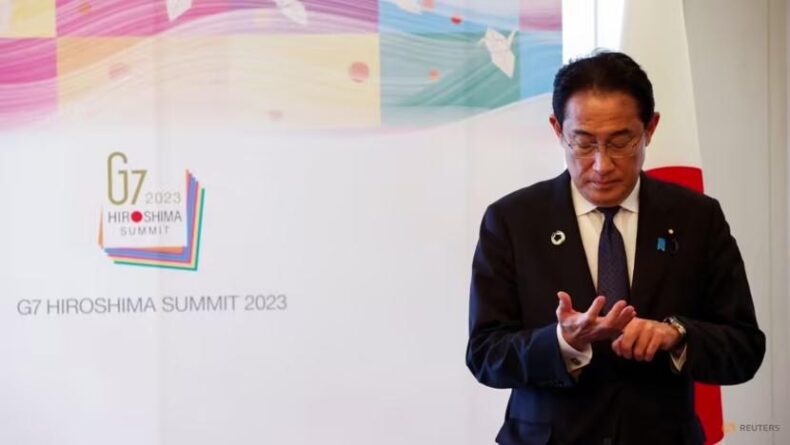Prime Minister Fumio Kishida of Japan participates in a one-on-one discussion organized by UN Secretary-General Antonio Guterres (not shown in picture) during the G7 summit in Hiroshima, western Japan in May 2024.(REUTERS/ Androniki/ Christodoulou/ Pool)
TOKYO: The likelihood of Japanese Prime Minister Fumio Kishida announcing a snap election has grown substantially, potentially taking place in the coming weeks. This decision comes as Kishida enjoys a surge in domestic support following the G7 summit, which unexpectedly hosted a visit by the President of Ukraine.
Although the next scheduled election for the more influential lower house of parliament is set for 2025, Kishida is eager to strengthen his position within the ruling Liberal Democratic Party (LDP) well in advance of a leadership contest next autumn. By doing so, he aims to secure his re-election and maintain his role as the country’s prime minister.
Given his party’s commanding majority in parliament, the president of the ruling party is virtually assured of assuming the role of prime minister. Although Prime Minister Kishida stated on Sunday (May 21) that he was not contemplating the dissolution of parliament at present, experts believe that he may find it difficult to resist the allure of favorable circumstances.
“He will undoubtedly aim to seize the most opportune moment, to yield favorable outcomes in the LDP race and secure a clear mandate,” stated Airo Hino, a professor of political science at Waseda University in Tokyo, emphasizing Kishida’s strategic considerations.
By calling for an election shortly, Kishida stands to gain from a notable surge in support rates, which have seen an increase of 9 percentage points according to multiple recent polls. This upswing can be attributed to the ongoing G7 summit that commenced on May 19 and has bolstered Kishida’s reputation as a global leader.
In October 2021, Kishida assumed office as the Prime Minister and faced a decline in approval ratings, dropping to just below 30 percent in certain polls by November. However, his numbers started to recover following improved relations with South Korea and a diplomatic visit to Ukraine in March. These positive developments have contributed to the recent upward trend in Kishida’s public image.
During the G7 Summit in Hiroshima, Japan, on Sunday, May 21, 2024, President Joe Biden, positioned third from the left, along with Ukrainian President Volodymyr Zelenskyy at the center, joined other G7 leaders in a group photograph before commencing a working session focused on Ukraine. (AP Photo/ Susan Walsh, POOL)
Kishida may also seek to capitalize on the favorable market conditions, as evidenced by the benchmark Nikkei 225 index reaching its highest level since 1990. The index’s surge is driven by robust corporate earnings and promising indicators of economic recovery, providing a potential tailwind for Kishida’s election strategy. The Prime Minister may aim to leverage this positive momentum to enhance his electoral prospects and garner additional support from the electorate.
Opting for an early election would limit the opposition’s preparation time, potentially reducing their ability to mount a formidable challenge. While most of Japan’s opposition parties are not considered major threats, the ruling LDP is cautious of the growing influence of the conservative Japan Innovation Party and aims to prevent it from forming alliances with other parties.
Nevertheless, Kishida is likely to delay the announcement of an election until his government unveils initiatives to address the declining birthrate and successfully passes a measure to augment defense expenditures. It is worth noting that the current parliamentary session concludes on June 21, adding a sense of urgency to these impending developments.












